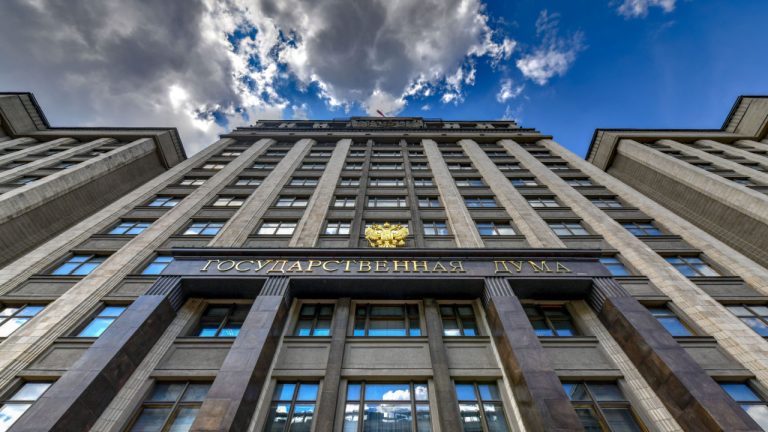 Russian lawmakers have approved a draft law facilitating the implementation of the digital version of the national currency, the ruble. The legislation amends various other acts to introduce definitions and establish procedures related to the launch of the central bank digital currency. Russian State Duma Passes Digital Ruble Draft Law on First Reading The lower […]
Russian lawmakers have approved a draft law facilitating the implementation of the digital version of the national currency, the ruble. The legislation amends various other acts to introduce definitions and establish procedures related to the launch of the central bank digital currency. Russian State Duma Passes Digital Ruble Draft Law on First Reading The lower […] The organization representing Russia’s crypto sector has asked the government in Moscow to clarify a proposal to introduce criminal liability for “gray” miners. The draft legislation seeks to punish those who fail to report their income to the state and share information about their digital assets. Crypto Companies in Russia Want to Take Part in […]
The organization representing Russia’s crypto sector has asked the government in Moscow to clarify a proposal to introduce criminal liability for “gray” miners. The draft legislation seeks to punish those who fail to report their income to the state and share information about their digital assets. Crypto Companies in Russia Want to Take Part in […] The draft law legalizing cryptocurrency mining will be resubmitted to Russian parliament which will postpone its adoption, one of its sponsors announced. Members of the lower house are also working on a separate bill that will introduce liability for those who mint digital coins illegally. Adoption of Russian Crypto Mining Legislation Postponed Again A bill […]
The draft law legalizing cryptocurrency mining will be resubmitted to Russian parliament which will postpone its adoption, one of its sponsors announced. Members of the lower house are also working on a separate bill that will introduce liability for those who mint digital coins illegally. Adoption of Russian Crypto Mining Legislation Postponed Again A bill […]
Assemblymember Timothy Grayson introduced the Digital Financial Assets Law to protect Californians from financial hardship and foster responsible innovation.
The Consumer Federation of California (CFC), a nonprofit advocacy organization working for consumer rights, sponsored a bill that seeks to license and regulate the activities of cryptocurrency exchanges.
The legislation demanding regulatory oversight of crypto businesses — the Digital Financial Assets Law — was introduced by Assemblymember Timothy Grayson with the aim of protecting Californians from financial hardship and fostering responsible innovation. Grayson believes that licensure is the next natural step for the crypto industry, adding:
“And it is equally clear that until we take that step, Californians will continue to be vulnerable to prevalent and preventable financial scams.”
This marks the CFC’s second attempt to license and regulate digital assets and cryptocurrency companies. The bill (AB 39) was first introduced in 2022, but California Governor Gavin Newsom vetoed it.
If passed, the bill will become law on Jan. 1, 2025, prohibiting citizens from engaging with crypto businesses until “certain criteria are met.” AB 39 will license crypto companies under the California Department of Financial Protection and Innovation, ensuring regulatory clarity and investor protection.
“The bankruptcies and scams of the past year only bolster our collective interest in ensuring basic and foundational consumer protections in this marketplace, which has up to now looked like the Wild West in terms of ‘anything goes’ behavior by key players in the cryptocurrency industry,” added Robert Herrell, executive director of the CFC, while revealing the intent behind the move.
The CFC believes the first hearing of this bill in the Assembly will be taken up in April.
Related: California cannabis producer adopts blockchain to track its weed
While Californian politicians try to introduce crypto regulations, the California Department of Motor Vehicles (DMV) tests the digitization of car titles and title transfers via a private Tezos blockchain.
As Cointelegraph reported, the agency wants to have the shadow ledger ironed out within the next three months, according to the California DMV’s chief digital officer Ajay Gupta.

A 15-member committee is tasked with working on a legal framework that will allow cryptocurrencies to operate in Central African Republic and expedite the development of the national economy.
Central African Republic (CAR), a developing country in Central Africa, set up a 15-member committee responsible for drafting a bill on the use of cryptocurrencies and tokenization in the region.
According to Faustin-Archange Touadéra, the president of CAR, cryptocurrencies can potentially help eradicate the country’s financial barriers. He believed in creating a business-friendly environment supported by a legal framework for cryptocurrency usage. A rough translation of the official press release reads:
“With access to cryptocurrencies, the monetary barriers existing until now will disappear, the main objective of the measures adopted by the government being the development of the national economy.”
The committee responsible for drafting the crypto bill comprises 15 experts from five ministries of CAR — Ministry of Mines and Geology, Ministry of Waters, Forest, Hunting and Fishing, Ministry of Agriculture ad Rural Development, Ministry of Town Planning, Land Reform, Towns and Housing and Ministry of Justice, Promotion of Human Rights and Good Governance.
15 experts #centrafricains issus de plusieurs ministères de mon gouvernement composent le comité chargé d'élaborer un nouveau projet de loi plus complet sur l'utilisation des crypto-monnaies et d'offrir à la RCA cette opportunité unique de développement économique & technologique pic.twitter.com/bZTS8HQxH3
— Faustin-Archange Touadéra (@FA_Touadera) January 20, 2023
Through collaboration, the members are tasked with working on a legal framework that will allow cryptocurrencies to operate in Central African Republic and expedite the development of the national economy.
Related: Bitcoin, Sango Coin and the Central African Republic
Crypto initiatives from the African continent marked another milestone as Nigerian crypto exchange Roqqu bagged a virtual currency license for the European Economic Area after two years of waiting for permission from regulatory authorities.
Roqqu CEO Benjamin Onomor told Cointelegraph that off-shore Africans send back over $5 billion to their relatives, and the current remittance system slows the process.
“It makes a lot of sense to solve this problem by using crypto as the vehicle. Crypto is a faster and cheaper route that can bridge the gap and help reduce fees in moving money globally. This is the core of the problem we want to solve,” he added.
 A proposal to eliminate the physical representation of the Argentine Peso, in order to streamline specific state processes and reduce tax evasion, has been presented by former banker Carlos Maria De Los Santos. The plan, identified as “Argentine Digital Peso,” also predicts that its implementation would lead to lower taxes and bring a surplus to […]
A proposal to eliminate the physical representation of the Argentine Peso, in order to streamline specific state processes and reduce tax evasion, has been presented by former banker Carlos Maria De Los Santos. The plan, identified as “Argentine Digital Peso,” also predicts that its implementation would lead to lower taxes and bring a surplus to […]
The Digital Trading Clarity Act of 2022 aims to provide regulatory clarity around classifying digital assets and related liabilities under existing securities laws.
United States Senator Bill Hagerty, a member of the Senate Banking Committee, introduced legislation seeking a safe harbor for cryptocurrency exchanges from “certain” Securities and Exchange Commission (SEC) enforcement actions.
The Digital Trading Clarity Act of 2022, introduced by Sen. Hagerty, aims to provide regulatory clarity around two primary concerns plaguing crypto exchange establishments — (i) the classification of digital assets and (ii) related liabilities under existing securities laws.

Sen. Hagerty outlined an overview of the problems amid regulatory hurdles:
“The current lack of regulatory clarity for digital assets presents entrepreneurs and businesses with a choice: navigate the significant regulatory ambiguity in the U.S., or move overseas to markets with clear digital asset regulations.”
The aforementioned regulatory uncertainty, according to Sen. Hagerty, discourages investments in the crypto spaces and hampers job creation opportunities in the US. As a result, the blockade “jeopardizes the United States’ leadership in this transformational technology at such a crucial time.”
The senator believed that the legislation, when passed, would not only provide “much-needed certainty” to crypto businesses but also improve the growth and liquidity of U.S. cryptocurrency markets.
To establish the legislation as law, the bill needs approval from the Senate, the House and the President of the United States.
Related: US lawmakers propose amending cybersecurity bill to include crypto firms reporting potential threats
Running parallel to the regulatory reforms recommended by the US senators, the federal government amped up efforts to study the feasibility of central bank digital currencies (CBDCs) in the American market.
Under Biden’s directive, the Office of Science and Technology Policy (OSTP) analyzed 18 CBDC design choices — outlining various pros and cons of each system:
“It is possible that the technology underpinning a permissionless approach will improve significantly over time, which might make it more suitable to be used in a CBDC system.”
The technical evaluation for a U.S. CBDC system highlighted the department’s inclination toward an off-ledger, hardware-protected system.

Opposing Assembly Bill 2269, Newsom recommended a “more flexible approach” that would evolve over time while considering the safety of consumers and related costs.
Adding to the existing regulatory hurdles for the crypto ecosystems, California Governor Gavin Newsom refused to sign a bill that would establish a licensing and regulatory framework for digital assets.
Assembly Bill 2269 sought to allow the issuance of operational licenses for crypto companies in California. On Sept. 1, California State Assembly passed the bill with no opposition from the assembly floor and went on to the governor’s office for approval.

Opposing the notion, Newsom recommended a “more flexible approach” that would evolve over time while considering the safety of consumers and related costs, adding:
“It is premature to lock a licensing structure in statute without considering both this work (in-house efforts to create a transparent regulatory environment) and forthcoming federal actions.”
The governor stated that the bill, in its current form, would require loaning “tens of millions of dollars” from the state’s general fund:
“Such a significant commitment of general fund resources should be considered and accounted for in the annual budget process.”
Newsom highlighted that he waits for federal regulations to “come into sharper focus for digital financial assets” before working with the Legislature to establish crypto licensing initiatives.
Related: Biden's anemic crypto framework offered us nothing new
The Office of Science and Technology Policy (OSTP) submitted an analysis to the White House regarding design choices for 18 central bank digital currency (CBDC) systems for the United States.
The technical evaluation for a U.S. CBDC system highlighted OSTP’s inclination toward building an off-ledger, hardware-protected system while considering the various trade-offs inherited by each design choice.

The bill amendment demands the Secretary of State submit reports to congressional committees explaining why the DOS made the determination to pay out rewards in cryptocurrency.
A new bill demanding a congressional notification prior to payments of the United States Department of State (DOS) rewards using cryptocurrencies surfaced as the U.S. Congress raised concerns about the evasion of sanctions.
The Rewards for Justice Program, a counterterrorism rewards program run by the Secretary of State, offers rewards for information that prevents international terrorism. Citing examples of Russia and Belarus as previously sanctioned regimes that have used cryptocurrencies to circumvent sanctions, the bill H. R. 7338 demands that:
“The Secretary of State shall notify the appropriate congressional committees not later than 15 days before paying out a reward in cryptocurrency.”
Congress highlighted the United Nations’ findings that 12 million Ukrainian residents would need humanitarian assistance and that cryptocurrencies have “been used as an effective cross-border payment tool to send millions to the Ukrainian Government, Ukrainian army, and Ukrainian refugees with limited access to financial services.”
The bill amendment demands the Secretary of State submit reports to congressional committees explaining why the DOS made the decision to pay out rewards in cryptocurrency.
If signed into law, the bill will require the DOS to list each crypto payments that were previously provided. Moreover, the federal department will also need to provide evidence as to why cryptocurrency payments would encourage whistleblowers to share intel when compared to rewarding with the US dollar or other prizes.
In doing so, the DOS must showcase an analysis of how crypto rewards could undermine the dollar’s dominance as the global reserve currency.
Related: White House OSTP department analyzes 18 CBDC design choices for the US
Following US president Joe Biden’s executive order on Ensuring Responsible Development of Digital Assets, federal agencies joined hands in publishing a fact sheet to articulate a clear framework for responsible digital asset development.
The “first-ever” fact sheet published by the White House consisted of seven sections, namely (1) Protecting Consumers, Investors, and Businesses; (2) Promoting Access to Safe, Affordable Financial Services; (3) Fostering Financial Stability; (4) Advancing Responsible Innovation; (5) Reinforcing Our Global Financial Leadership and Competitiveness; (6) Fighting Illicit Finance and (7) Exploring a U.S. Central Bank Digital Currency (CBDC).
While some of the sections don’t contain any particularly new information, federal agencies recommend the creation of a federal framework for nonbank payment providers in addition to encouraging the adoption of instant payment systems like FedNow, which is expected to launch in 2023.
 The changing geopolitical and economic environment, as well as persisting differences between responsible government institutions, are hindering the advance of legislation tailored to regulate cryptocurrency mining in Russia. According to a report quoting industry watchers, these factors are halting the advance of the necessary legislation. Two Draft Laws on Mining Await Approval by the Russian […]
The changing geopolitical and economic environment, as well as persisting differences between responsible government institutions, are hindering the advance of legislation tailored to regulate cryptocurrency mining in Russia. According to a report quoting industry watchers, these factors are halting the advance of the necessary legislation. Two Draft Laws on Mining Await Approval by the Russian […]